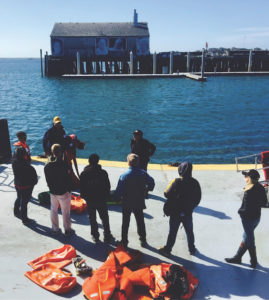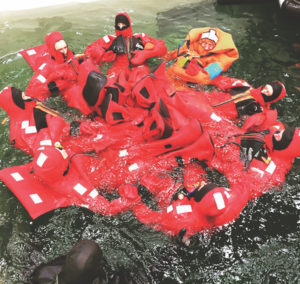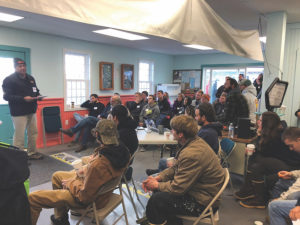Close brushes with death are common for Outer Cape fishermen.
Rick Marvin of Eastham, who fishes for lobster, bluefish, and crab, knows from experience that a routine move can quickly become dangerous on a fishing boat.
One day in early December 2017, Marvin was tossing lobster traps off the side of a boat when his boot became entangled in the rope attached to the trap he had just thrown overboard, which was rapidly sinking into the sea.
“Before I knew it, I was dragged off the boat, and all I saw was water,” Marvin said. There was no time to cut the rope, so “after I hit the water and went down some feet, I made one last desperate attempt to knock my boot off.”
It worked. As the boot was dragged into the depths, Marvin swam in his bulky clothing towards the surface and was then hauled onboard by the crew.
Although terrifying to imagine, Marvin’s experience is not uncommon. “I’ve heard a lot of horror stories” from other fishermen, he said.
A Risky Business
Fishing was the most dangerous profession in the U.S. in 2017, according to the Bureau of Labor Statistics. That year fishermen experienced a rate of 99.8 fatalities per 100,000 full-time employees. Logging was the second most fatal profession, with 84.3 fatalities per 100,000 workers.
From 2000 to 2015, there were a total of 725 commercial fishing fatalities in the U.S., the majority of which resulted from unintentional falls overboard and vessel disasters from large waves or flooding. During this same period, 221 crew members, none of whom were wearing personal flotation devices (PFDs), drowned after falling overboard. In about half of those cases the fishermen were alone, with no one to witness their fall.

Fishing Partnership Support Services navigator Morgan Eldredge, who is based in Chatham, explained that working on the water is inherently riskier than working on land. “You don’t have quick access to emergency care when you’re in a vessel,” she said. “The Coast Guard isn’t right down the street like the ambulance is.”
Training Prevents Panic
“You’d be surprised at the number of fishermen who don’t know how to swim,” Eldredge said. “They say, ‘I work in the water. I don’t go in the water.’ ”
Although fishermen may not like to contemplate going overboard, Eldredge says she has seen a “huge change in the last six years” in local fishermen’s willingness to wear PFDs.
Eldredge believes this change arose in part from the Fishing Partnership’s safety training, which began in 2012. The program has been popular: in 2019, 77 Cape Cod fishermen participated. Younger fishermen have been especially eager to get the instruction, Eldredge said.
In safety training crew members learn how to respond to emergencies onboard. Over the course of two days, fishermen learn CPR and first aid, as well as how to deal with fires, falls overboard, and flooding.
Participants also have a chance to learn to use emergency equipment. From deploying life rafts to setting off a flare, “Most of them have never seen these things used in real life,” Eldredge said. “The last thing you want to do is to put that survival suit on and jump in the water for the first time in an emergency.”
Although larger boats can handle waves and bad weather better than smaller boats, Eldredge said the most important thing is training and taking proper precautions. The crews of all commercial fishing vessels that work in federal waters must perform monthly life-saving drills, which are logged and checked by the Coast Guard, she said.
Lobster fisherman Michael Milewski of Provincetown said that the safety training was “very helpful.” He has been fishing for the past six years with his brother, and they have both been pulled overboard a few times after getting entangled in gear.
Milewski has already put his safety training to use. He has twice been on a boat that sprung a leak, once before the training and once after. The first time, “I remember panicking,” he said. “A couple years later, I was able to stay calm, figure out the situation, and fix the problem from what we learned in training. The more you practice, the more prepared you are for the situation at hand, and you don’t panic.”

Securing Insurance
Because of the riskiness of the profession, securing reasonable health insurance was in the past a notoriously difficult challenge for fishermen. That’s another thing that has changed, and that change began here on the Cape.
The Fishing Partnership was founded in 1997 to address this issue. It created “an affordable health plan that covered a group of hard-to-reach, chronically uninsured, high-risk individuals and ran it successfully for nearly 15 years,” its website states.
Eldredge said that the Fishing Partnership’s way of using income to determine premiums became the model for “Romneycare” in Massachusetts — which itself was the inspiration for the Affordable Care Act, the program some still call “Obamacare.”
Insurance premiums no longer depend solely on the riskiness of a job, Eldredge said. “The cost of the plans depends on your zip code and age she said. Now fishermen are covered in the same way their neighbors are. “It doesn’t have to do with occupation,” Eldredge said.
With its original purpose resolved, the Fishing Partnership now acts as a resource to fishing families, providing advice on insurance decisions.
Eldredge said that signing up for insurance can be confusing because premiums are based on predicted income, which, for fishermen, varies depending on the season and environmental factors.
Milewski appreciates the Partnership’s work. “I always have a lot of questions about health insurance,” he said. “With nine months to make all the money for the year, I don’t have time after a 17-hour day to try to figure out why my health insurance isn’t working. It’s been a huge help.”
Challenges Remain
Although training has made fishing safer and affordable insurance is available to fishermen and their families, there are still major obstacles to improving health and safety off and onboard.
Locally, finding local health care providers is one important challenge that remains. “It’s another frustrating factor on the Outer Cape,” said Eldredge. “The more affordable plans don’t have as many providers in this area. People feel stuck.”
There is no avoiding the fact that fishing is hard physical work. It seems clear it should not be done alone. Eldredge said that fishermen who are pressed to cut costs, including crew members, can mean more fishermen setting off alone, a scenario that can easily turn an accident into a disaster.

Long days also put fishermen at higher risk of making the mistakes that lead to injuries. Eldredge points out that quotas and closures can put fishermen under pressure to work long hours when they can, and go out even in bad weather.
Milewski and his brother are a good example. Between their two boats, they fish 1,600 traps each week and work long days, staying on the water for 17 hours from sunrise to sunset to earn all they can during the nine months that the lobster fishery is open.
“Fatigue,” said Eldredge, is one of the biggest risk factors fishermen face.
Staff reporter Ryan Fitzgerald contributed to this story.



